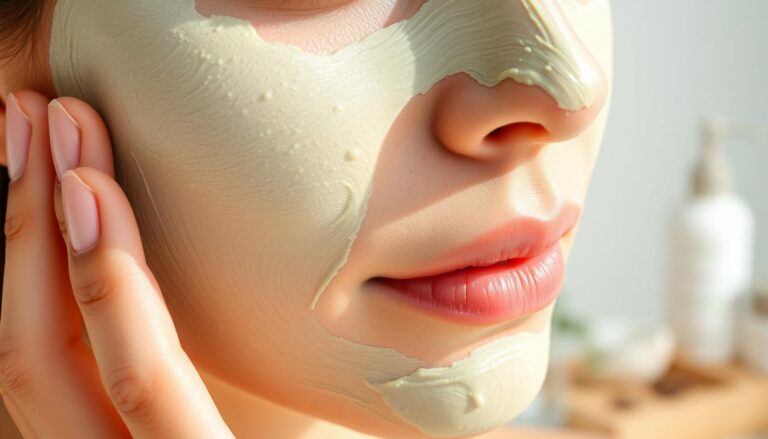At Glowskinhub.com, we believe beauty isn’t just a look—it’s a feeling
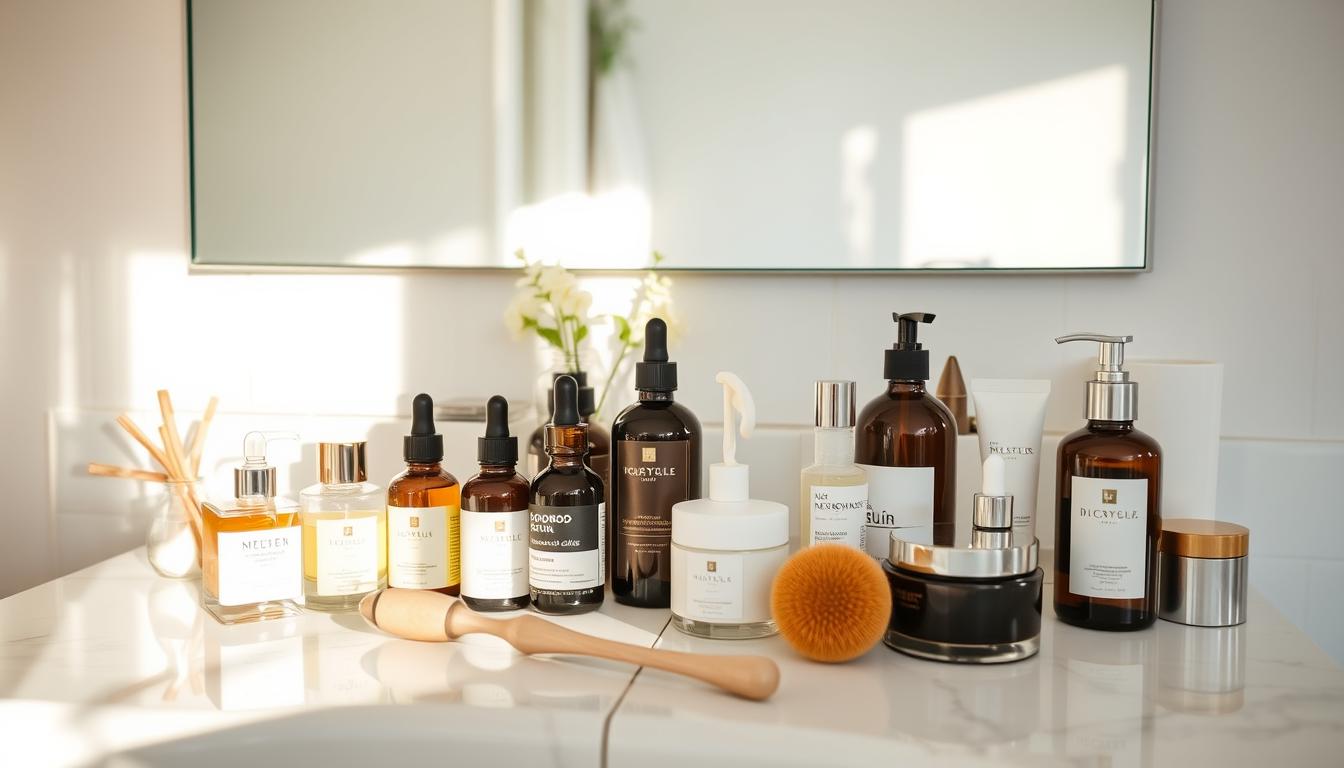
Best Skincare Routine for Oily Skin 2025
Can a well-crafted skincare routine really make a difference for those with oily Skin?
Having a tailored routine is crucial, especially with the latest trends and product developments in 2025. A routine that is designed to manage excess sebum production, reduce acne, and achieve a balanced Skin tone can be a game-changer.
A good skincare routine for oily Skin is not just about using any product; it’s about using the right products that cater to your Skin’s specific needs.
Key Takeaways
- Understanding your Skin type is crucial for an effective routine.
- Using products that are labelled ‘non-comedogenic’ or ‘oil-free’ can help.
- A consistent routine can significantly reduce acne and excess sebum.
- Products containing salicylic acid can be beneficial for oily Skin.
- Moisturising is still essential, even for oily Skin.
Understanding Oily Skin: Causes and Characteristics
Understanding the intricacies of oily Skin is crucial for devising an effective skincare routine. Oily Skin, characterised by its shiny appearance and large pores, can be a persistent issue for many individuals.
What Causes Excess Sebum Production?
Excess sebum production is a primary characteristic of oily Skin. Several factors contribute to this condition, including genetics, hormonal imbalances, and certain medications. For instance, hormonal fluctuations during puberty, pregnancy, or menopause can lead to increased sebum production. Additionally, certain medications like corticosteroids and certain antidepressants can also trigger or exacerbate oily Skin.
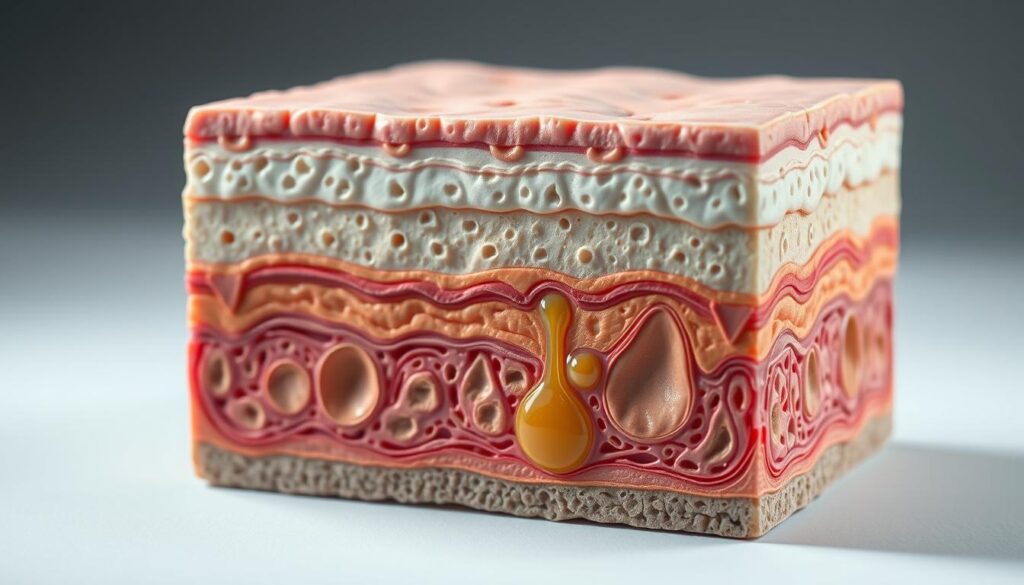
Common Characteristics of Oily Skin
Oily Skin is often associated with a shiny complexion, enlarged pores, and a higher propensity for acne and blackheads. Individuals with oily Skin may also experience frequent breakouts due to the clogging of pores by excess sebum and dead Skin cells.
| Characteristics | Description |
|---|---|
| Shiny Complexion | A persistent shine, especially on the T-zone (forehead, nose, and chin) |
| Enlarged Pores | Visible pores, particularly on the nose and forehead |
| Acne and Blackheads | Frequent breakouts and blackheads due to clogged pores |
Myths About Oily Skin Debunked
A common myth surrounding oily Skin is that it does not need moisturising. However, depriving oily Skin of moisture can lead to increased sebum production as the Skin tries to compensate for the dryness. Another misconception is that oily Skin is not susceptible to sun damage; in reality, oily Skin can still suffer from UV damage, making sunscreen an essential part of any skincare routine.
Why Oily Skin Needs a Specialised Routine
Individuals with oily Skin face specific challenges that a tailored skincare routine can address. Oily Skin is characterised by excessive sebum production, leading to a shiny appearance and potentially causing acne.
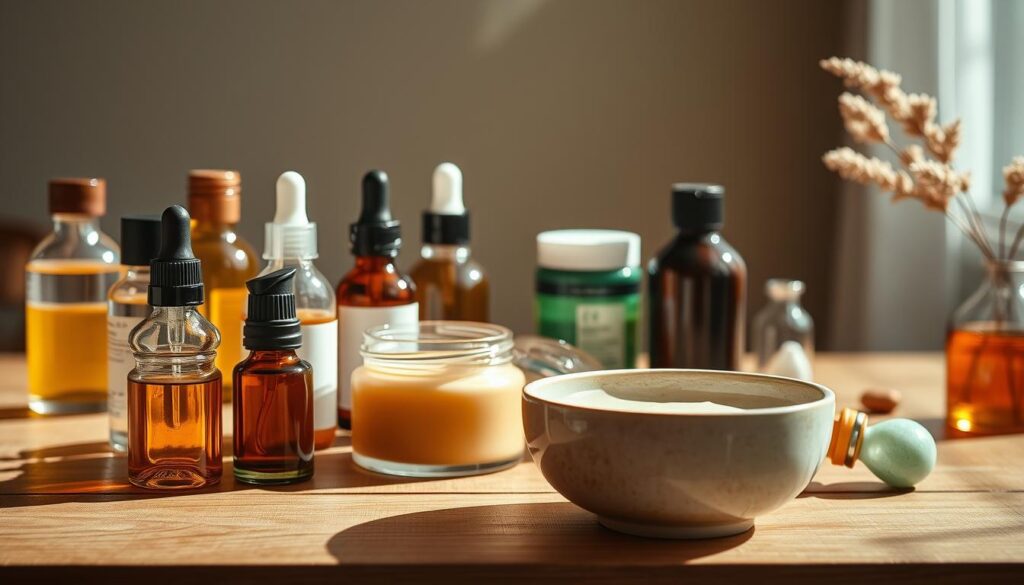
The Unique Challenges of Oily Skin
Oily Skin is not just about shine; it’s also prone to enlarged pores and acne. A specialised routine helps in managing these issues effectively.
Benefits of a Tailored Approach
A customised skincare routine for oily Skin can help in:
- Reducing excess sebum production
- Minimising acne occurrences
- Achieving a more even Skin tone
Using the best products for oily Skin is crucial in this regard.
How Oily Skin Ages Differently
Oily Skin tends to age differently compared to dry or normal Skin. While it may stay smoother for longer, it is not entirely exempt from ageing. A well-planned skincare routine that includes oily Skin products can help in maintaining Skin health over time.
Morning Skincare Routine for Oily Skin
Starting your day with a well-structured morning skincare routine is crucial for managing oily Skin. A consistent regimen helps control excess oil production, reduces the appearance of pores, and maintains a balanced complexion throughout the day.
Step 1: Gentle Cleansing
The first step in your morning skincare routine should be gentle cleansing. Use a gel or foaming cleanser specifically formulated for oily Skin. These cleansers effectively remove dirt and excess oil without stripping the Skin of its natural moisture. Look for products containing salicylic acid or tea tree oil, known for their oil-controlling properties.
Step 2: Toning to Balance
After cleansing, toning helps balance the Skin’s pH and tighten pores. Opt for a toner that is alcohol-free to avoid drying out your Skin. Toners with witch hazel or rose water can be particularly beneficial for oily Skin, as they help reduce oiliness without causing irritation.
Step 3: Lightweight Hydration
Even oily Skin needs hydration. Use a lightweight, oil-free moisturizer that won’t clog pores. Gel-based moisturizers are excellent for oily Skin as they provide hydration without the heaviness. Hyaluronic acid is a key ingredient to look for, as it retains moisture without exacerbating oiliness.
Step 4: Sun Protection
Finally, apply a broad-spectrum sunscreen with at least SPF 30. Choose a sunscreen that is labeled “non-comedogenic” or “oil-free” to ensure it doesn’t clog pores. Sunscreen is crucial for preventing premature aging and Skin damage, even on cloudy days.
| Step | Product Type | Key Ingredients |
|---|---|---|
| 1. Cleansing | Gel or Foaming Cleanser | Salicylic Acid, Tea Tree Oil |
| 2. Toning | Alcohol-Free Toner | Witch Hazel, Rose Water |
| 3. Hydration | Lightweight Moisturizer | Hyaluronic Acid |
| 4. Sun Protection | Non-Comedogenic Sunscreen | SPF 30 or Higher |

By following these steps and using the right products, you can create an effective morning skincare routine that helps manage oily Skin and keeps your complexion balanced and healthy.
Evening Skincare Routine for Oily Skin
For individuals with oily Skin, a well-structured evening skincare routine can make a significant difference. It helps in removing dirt and excess oil accumulated throughout the day, preparing the Skin for the night ahead.
Step1: Double Cleansing
Double cleansing is a must for oily Skin. It involves first using an oil-based cleanser to remove makeup and sunscreen, followed by a water-based cleanser to deep clean the pores. This method ensures thorough cleansing without stripping the Skin of its natural oils.
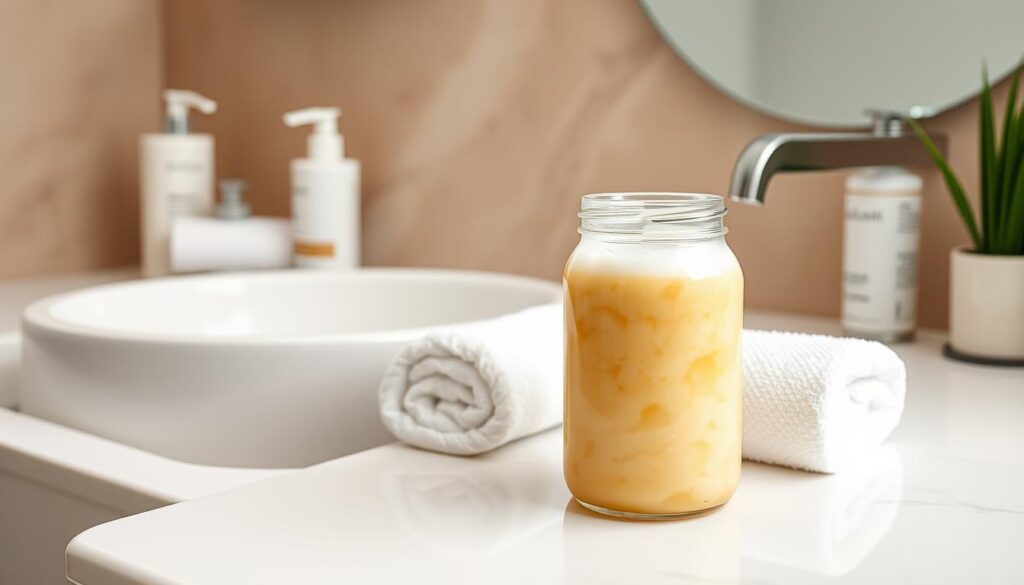
Step2: Exfoliation (2-3 times weekly)
Exfoliation is crucial for removing dead Skin cells and unclogging pores, which can help reduce oiliness. Using a chemical exfoliant containing salicylic acid or glycolic acid can be particularly effective for oily Skin.
Step3: Treatment Products
After cleansing and exfoliating, applying treatment products can help address specific Skin concerns such as acne or hyperpigmentation. Products containing niacinamide can be beneficial as they help in reducing inflammation and improving Skin elasticity.
Step4: Night Moisturiser
Even oily Skin needs moisturising to maintain its barrier function. Using a lightweight, oil-free night moisturiser can help keep the Skin hydrated without clogging pores. Look for products labeled ‘non-comedogenic’ or ‘oil-free’ to ensure they are suitable for oily Skin.
By following this evening skincare routine, individuals with oily Skin can effectively manage oil production, reduce the appearance of pores, and maintain a healthier complexion.
Best Skincare Routine for Oily Skin: Essential Ingredients to Look For
For individuals with oily Skin, certain ingredients can help regulate sebum production and reduce acne. Understanding these key components can significantly enhance your skincare routine.
Salicylic Acid and BHAs
Salicylic acid, a beta hydroxy acid (BHA), is renowned for its ability to penetrate deep into pores, unclogging them and reducing acne. It exfoliates the Skin, removing dead Skin cells and helping to prevent future breakouts. Products containing salicylic acid are particularly beneficial for oily Skin as they help control sebum production and reduce inflammation.
Niacinamide
Niacinamide is a versatile ingredient that improves Skin elasticity and enhances its barrier function. It is effective in reducing inflammation and can help in minimizing pore appearance. For oily Skin, niacinamide can be particularly helpful as it regulates sebum production and improves Skin’s overall texture.
Hyaluronic Acid
Contrary to popular belief, hyaluronic acid is beneficial even for oily Skin. It provides lightweight hydration without clogging pores, helping to balance the Skin’s moisture levels. This is crucial as overly dry Skin can sometimes lead to increased sebum production.
Clay and Charcoal
Clay and charcoal are known for their detoxifying properties. They help absorb excess oil and purify the Skin, making them ideal for oily Skin types. Clay masks, in particular, can be used once or twice a week to deep clean pores and reduce shine.
By incorporating products with these essential ingredients into your skincare routine, you can effectively manage oily Skin, reduce acne, and achieve a more balanced complexion. Always remember to patch test new products and consult with a dermatologist if you have persistent Skin issues.
Top Cleansers for Oily Skin in 2025
Effective cleansing is the cornerstone of any skincare routine, especially for those with oily Skin in 2025. The right cleanser can help control sebum production, reduce acne, and improve overall Skin health.
Gel Cleansers from UK Brands
Gel cleansers are a popular choice for oily Skin due to their lightweight, non-greasy texture. UK brands such as Simple and Neutrogena offer effective gel cleansers that are formulated to control oil without stripping the Skin of its natural moisture.
For instance, Simple’s Refreshing Facial Wash Gel is a gentle, effective option that cleanses the Skin without causing dryness.
Foaming Cleansers for Deep Cleansing
Foaming cleansers are known for their deep cleansing abilities, making them ideal for oily Skin that is prone to clogged pores. Brands like Glossier and La Roche-Posay offer foaming cleansers that effectively remove dirt and excess oil.
“A good cleanser is essential for maintaining healthy, balanced Skin. It sets the stage for the rest of your skincare routine.”
A notable example is La Roche-Posay’s Toleriane Ultra Fluid Face Wash, which is designed for sensitive oily Skin, providing a gentle yet effective cleanse.
Micellar Waters for Quick Cleansing
Micellar waters are a convenient, quick cleansing option for oily Skin, especially for those on-the-go. They effectively remove dirt and makeup without the need for rinsing. Garnier and Bioderma are two UK-recommended brands offering micellar waters suitable for oily Skin.
| Cleanser Type | Brand | Product Name |
|---|---|---|
| Gel Cleanser | Simple | Refreshing Facial Wash Gel |
| Foaming Cleanser | La Roche-Posay | Toleriane Ultra Fluid Face Wash |
| Micellar Water | Garnier | SkinActive Micellar Water |
When choosing a cleanser for oily Skin, it’s essential to consider your Skin type and needs. Whether you prefer a gel, foam, or micellar water, there’s a product out there that’s right for you.
Best Toners and Exfoliants for Oily Complexions
Finding the right toner and exfoliant is crucial for maintaining a balanced oily Skin regimen. Toners help balance the Skin’s pH, while exfoliants remove dead Skin cells and unclog pores, both of which are essential for controlling shine and achieving a clearer complexion.
Alcohol-Free Toners
Alcohol-free toners are ideal for oily Skin as they help balance the Skin without stripping it of its natural oils. Thayers Rose Petal Witch Hazel is a popular choice, known for its soothing properties and ability to tighten pores.
Chemical Exfoliants
Chemical exfoliants, such as those containing salicylic acid or glycolic acid, are effective in removing dead Skin cells and unclogging pores. They help in reducing acne and preventing future breakouts, making them a crucial part of an oily Skin treatment regimen.
Enzyme Treatments
Enzyme treatments offer a gentler alternative to chemical exfoliants. They work by breaking down dead Skin cells using natural enzymes like papain or bromelain, helping to maintain a smooth and clear complexion without the harsh effects of some chemical exfoliants.
| Product Type | Key Ingredients | Benefits |
|---|---|---|
| Alcohol-Free Toners | Witch Hazel, Aloe Vera | Balances Skin pH, Soothes |
| Chemical Exfoliants | Salicylic Acid, Glycolic Acid | Unclogs pores, Reduces acne |
| Enzyme Treatments | Papain, Bromelain | Gently exfoliates, Smooths Skin |
By incorporating these toners and exfoliants into your oily Skin regimen, you can achieve a more balanced and clearer complexion. Whether you opt for alcohol-free toners, chemical exfoliants, or enzyme treatments, the key is to find products that work best for your Skin type and needs.
Serums and Treatments That Control Shine
Achieving a balanced, shine-free complexion is possible with the right combination of serums and treatments tailored to oily Skin. Serums and treatments are crucial in a skincare routine as they address specific Skin concerns such as excess oil production, enlarged pores, and acne.
Oil-Control Serums
Oil-control serums are designed to reduce sebum production and minimise pores. These serums often contain ingredients like salicylic acid and niacinamide, which help to regulate oil production and improve Skin texture. For instance, a Serum with niacinamide can help improve the Skin’s barrier function, reducing the appearance of pores and controlling shine.
Spot Treatments
Spot treatments are effective for targeting specific areas of concern, such as acne and redness. Products containing benzoyl peroxide or tea tree oil are beneficial for their antibacterial properties, helping to reduce acne and prevent future breakouts. Applying a spot treatment directly to the affected area can help control shine and reduce inflammation.
Pore-Minimising Products
Pore-minimising products help to reduce the appearance of enlarged pores, giving the Skin a smoother appearance. Ingredients such as clay and charcoal are known for their ability to absorb excess oil and purify the Skin. Using a pore-minimising product can enhance the overall texture of the Skin, making it look more even and refined.
When selecting serums and treatments for oily Skin, it’s essential to look for products that are labelled “oil-free” or “non-comedogenic” as these are less likely to clog pores. By incorporating the right serums and treatments into your skincare routine, you can effectively control shine and achieve a more balanced complexion.
Moisturisers and Sunscreens That Won’t Clog Pores
Managing oily Skin effectively requires a careful selection of skincare products that hydrate and protect without clogging pores. The key to achieving this balance lies in choosing products that are labelled ‘non-comedogenic’ or ‘oil-free,’ as these are specifically designed not to exacerbate oily Skin.
Gel-Based Moisturisers
Gel-based moisturisers are an excellent choice for oily Skin as they provide hydration without the heaviness of traditional creams. They are typically lightweight and absorb quickly, reducing the risk of clogged pores. Neutrogena Hydro Boost Water Gel is a popular example that not only moisturises but also contains hyaluronic acid to retain moisture.
Oil-Free Sunscreens
Sunscreens are crucial for daily skincare, regardless of Skin type. For oily Skin, oil-free sunscreens are the best option as they protect against UV rays without adding extra oil. La Roche-Posay Anthelios Melt-In Sunscreen Milk is a highly recommended product that is lightweight and non-greasy.
Mattifying Products
Mattifying products help control shine and reduce the appearance of pores. They often contain ingredients like silica or talc that absorb excess oil. Using a mattifying primer or moisturiser can help keep the Skin matte throughout the day. Primer by Rimmel is a great option that not only mattifies but also prepares the Skin for makeup.
Here’s a comparison of some popular products:
| Product | Type | Key Ingredients | Price |
|---|---|---|---|
| Neutrogena Hydro Boost Water Gel | Gel Moisturiser | Hyaluronic Acid | £17 |
| La Roche-Posay Anthelios Melt-In Sunscreen Milk | Oil-Free Sunscreen | Antioxidants, La Roche-Posay Thermal Water | £25 |
| Rimmel Mattifying Primer | Mattifying Primer | Silica | £6 |
By incorporating these products into your skincare routine, you can effectively manage oily Skin while keeping it hydrated and protected.
Seasonal Adjustments for Oily Skin in the UK Climate
Adapting your skincare routine to the UK’s changing seasons is crucial for managing oily Skin effectively. The UK’s climate varies significantly throughout the year, with cold winters and mild summers, each presenting unique challenges for oily Skin.
Winter Care for Oily Skin
During winter, the cold weather and central heating can strip the Skin of its natural moisture, potentially leading to increased sebum production. To combat this, use a gentle cleanser that doesn’t dry out your Skin. Incorporating a lightweight moisturiser can help maintain the Skin’s barrier function without clogging pores.
Summer Skincare Adjustments
Summer brings its own set of challenges, including increased humidity that can exacerbate oily Skin. Using oil-free sunscreens and mattifying products can help control shine. It’s also beneficial to exfoliate regularly to remove dead Skin cells and unclog pores.
Dealing with Humidity and Central Heating
Both humidity and central heating can impact oily Skin. In humid conditions, the Skin produces more sebum, while central heating can dehydrate the Skin, causing it to produce even more oil. Using toners that balance the Skin’s pH and blotting papers throughout the day can help manage oiliness. A list of effective products includes:
- Oil-control serums
- Clay-based masks
- Salicylic acid-based cleansers
By adjusting your skincare for oily Skin regimen according to the season and using the right products, you can effectively manage oily Skin in the UK climate. This tailored approach is part of a comprehensive oily Skin regimen that addresses the specific needs of oily Skin throughout the year.
Lifestyle Factors That Affect Oily Skin
Oily Skin can be influenced by various lifestyle factors, including diet, stress levels, and overall health habits. Understanding these factors is crucial for effectively managing oily Skin.
Diet and Hydration
A well-balanced diet rich in fruits, vegetables, and whole grains can help in maintaining healthy Skin. Hydration is also key; drinking plenty of water helps flush out toxins that could otherwise lead to Skin issues. Incorporating foods high in omega-3 fatty acids, such as salmon, can help reduce inflammation, a factor that can exacerbate oily Skin.
Stress Management
Stress can trigger hormonal imbalances that may lead to increased sebum production. Practicing stress-reducing techniques like meditation or yoga can help manage stress levels, thereby potentially reducing the severity of oily Skin.
| Lifestyle Factor | Impact on Oily Skin | Recommended Action |
|---|---|---|
| Diet | Affects sebum production and inflammation | Eat a balanced diet, include omega-3 rich foods |
| Stress | Can cause hormonal imbalances | Practice stress management techniques like yoga or meditation |
| Exercise | Improves circulation, reduces stress | Engage in regular physical activity |
| Sleep | Affects hormonal balance and Skin regeneration | Ensure 7-8 hours of sleep per night |
Exercise and Skincare
Regular exercise not only improves overall health but can also enhance Skin condition by improving circulation and reducing stress. It’s essential to cleanse the Skin after exercising to prevent sweat and bacteria from clogging pores.
Sleep Quality
Good sleep quality is vital for overall health, including Skin health. Poor sleep can lead to hormonal imbalances that may affect oily Skin. Ensuring 7-8 hours of sleep per night can help in maintaining a healthy Skin balance.
Conclusion: Creating Your Personalised Oily Skin Regimen
Developing the best skincare routine for oily Skin involves understanding your Skin’s unique needs and adapting your regimen accordingly. By incorporating the right products and techniques, you can effectively manage oil production, reduce the appearance of pores, and achieve a healthier complexion.
A successful oily Skin routine is not one-size-fits-all; it’s about finding the right balance for your Skin type. Whether you’re using salicylic acid, niacinamide, or hyaluronic acid, the key is consistency and patience. Consider your lifestyle factors, such as diet, stress levels, and sleep quality, as these can significantly impact your Skin’s health.
By following the guidelines outlined in this article and tailoring your skincare routine to your specific needs, you can enjoy a clearer, more balanced complexion. Experiment with different products, pay attention to how your Skin responds, and adjust your oily Skin routine as needed to achieve the best results.

